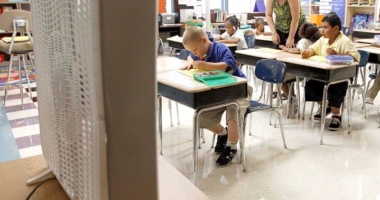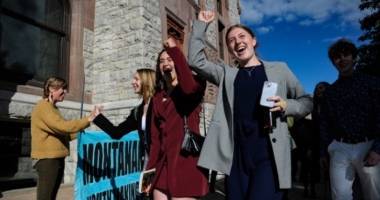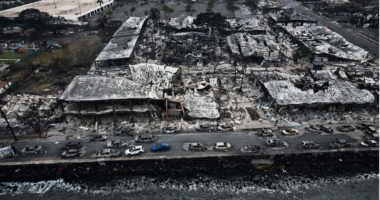Climate, Health and Equity Brief
Dire warnings from the IPCC
April 3, 2023

The Climate, Health & Equity Brief is GMMB’s take on the last two weeks’ news on the current impacts of climate change. If you haven’t subscribed yet, you can do so by clicking here.
Hot Topic: Necessary choices. History will note what this year’s UN International Panel on Climate Change (IPCC) Report lays bare: We have both the knowledge and the tools to curb emissions and avoid cataclysmic global warming—and if we fail to do so, it will be due to a lack of collective and individual will.
Global temperature rise is now set to exceed 1.5°C (2.7°F) within just 10 years—a situation the IPCC says is “unequivocally” due to human-caused greenhouse gas emissions. The report states that without deep emissions reductions, cataclysmic scenarios beyond 3°C (5.4°F) of warming this century are much more likely, with immense risks to humanity.
With each passing year that emissions continue, the necessary solutions grow in intensity and difficulty. Decades of inaction have denied us the luxury of a gradual transition to a more sustainable economy and society: The panel reports that even limiting warming to less than 2°C will require “deep, rapid and immediate” efforts across all sectors and warns that any time spent beyond the 1.5°C threshold will make the gradual reduction in global temperature more difficult to achieve due to unlocked feedback loops.
Despite the bleak outlook, the report notes that energy transition policies and technologies are making a real, meaningful difference. In some regions, wind and solar energy are now cheaper than fossil fuel use. In the past decade, many countries have proved it is possible to cut emissions significantly while still growing their economies. And despite the inequitable impacts of climate change, efforts like the UN’s loss and damage fund could result in the world’s richest and most developed nations assisting poorer nations with just solutions.
The climate crisis now demands that we, like the world’s governments, reflect on our choices in this critical period—including but not limited to the way we eat, travel, consume and vote. As IPCC chairman Hoesung Lee noted, “the choices we make now and in the next few years will reverberate around the world for hundreds, even thousands, of years.”
— Matt and Traci
Human Health
The latest IPCC report says the world will likely surpass 1.5°C (2.7°F) of warming within 10 years, and “every increment of warming will intensify multiple and concurrent hazards” without “deep, rapid, sustained reductions” in greenhouse gas emissions. (The Washington Post)
A new report revealed that one-fifth of UK hospitals were forced to cancel operations during a massive heatwave last July—with temperatures reaching as high as 104°F—due to National Health Service buildings not being equipped to withstand the heat. (The Guardian)
A new study found that climate change is contributing to an increase in Vibrio vulnificus, a flesh-eating bacteria in warm, low-salinity waters along the East Coast of the U.S. (CBS News)
Planetary Health
A new report warned that global energy transition investments must quadruple to $5 trillion by 2030 to reach the target of keeping global warming below 1.5 degrees Celsius. (Utility Dive)
Sea creatures are washing up dead around the world as climate change continues to heat oceans, change water chemistry, increase toxic algal blooms and drive creatures from their normal habitats. (The Washington Post)
In just one year, monarch butterflies migrating to Mexico’s Michoacán state dropped by 22% as increasing temperatures and logging threaten the habitats of a pollinator critical to supporting the region’s agricultural food production. (The Washington Post)
Scientists in a new study suggest that restoring populations of land and marine animals in designated “rewilding” zones across the planet could aid in accelerating the carbon cycle and facilitate the additional capture of nearly 500 gigatons of CO2 by 2100. (Inside Climate News)
Equity
Black women environmental justice advocates led by faith are leading the charge to stop the continued pollution of Louisiana’s “Cancer Alley,” scoring some big wins in a region with a large Black population, more than 150 petrochemical plants and abnormally high cancer risk. (Inside Climate News)
New York finalized its list of disadvantaged communities to be first in line for cleanup and climate funding in the state’s multibillion-dollar climate plan by using 45 different environmental and socioeconomic data points, like poverty rates, asthma emergency room visits, projected flooding rates, and racial demographics. (Gothamist)
Politics & Economy
The annual Economic Report of the President warned that climate change is posing severe economic challenges for the United States that require the federal government to reassess its spending priorities. (The New York Times)
The Biden administration approved the auction of 73 million acres in the Gulf of Mexico for offshore oil drilling as required by Sen. Joe Manchin’s additions to the Inflation Reduction Act, which could lock in new oil drilling in the Gulf through 2070. (CNN)
The melting Arctic has sparked a geopolitical rivalry for its now-available resources and shipping routes, and President Biden has nominated the first ambassador-at-large for the region as the U.S. military prepares to deal with national security threats from Russia and China. (NPR)
Investigations have found that language in the dire UN IPCC report about the environmental costs of burning fossil fuels and consuming meat was watered down by corporate influence and fierce negotiations between countries protecting their financial and political interests. (Inside Climate News)
A new estimate suggests that 40 of the world’s top livestock producers could see meat and dairy profits fall by a record $24 billion by 2030 as a result of climate change, according to an analysis by collaborative investor network FAIRR. (Bloomberg)
Life as We Know It
An annual survey by the European Investment Bank found that two-thirds of Europeans support stricter government measures on consumer behavior to tackle climate change, signaling people do believe individual behavior makes a difference in climate mitigation. (Bloomberg)
Surfers and scientists alike estimate California’s Mavericks Beach has lost 20 to 30 feet of coastline since 1990 due to erosion sped up by extreme weather, irreversibly changing the iconic big-wave surfing beach. (The Washington Post)
Action
The Biden administration has granted California the authority to require that half of all heavy vehicles sold in the state must be all-electric by 2035, an aggressive, first-in-the-nation plan that exceeds federal standards and is designed to clean up the worst polluters on the road. (The Washington Post)
In 2022, electricity generated from renewables surpassed coal in the U.S. for the first time, with wind and solar energy contributing 14% of the electricity produced domestically. (AP News)
Third Act, a climate group focused on mobilizing older Americans, organized protests nationwide against JPMorgan Chase, CitiBank, Bank of America and Wells Fargo for their continued funding of oil and gas projects. (The Guardian)
The Biden administration announced a new Ocean Climate Action Plan that aims to “harness” the power of the ocean against the climate crisis by outlining new policies, identifying gaps in science and management and recommending new actions to protect ocean health. (USA Today)
Kicker
Check out the 50 States of Climate Change, a state-by-state guide to climate change impacts already unfolding in the United States that highlights ways to get involved in local mitigation and adaptation efforts. (Outside)
It’s now or never.”
– IPCC
The GMMB Climate, Health & Equity Brief would not be possible without the contributions of the larger GMMB team— Aaron Benavides, Thomas Baer, Stefana Hendronetto, Sharde Olabanji and Quincy Tichenor. Feedback on the Brief is welcome and encouraged and should be sent to CHandEBrief@gmmb.com.






